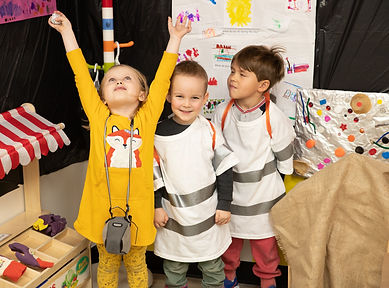


Universal Pre-K (Ages 4-5)
Our UPK program here at Bunny Hill is a combination of play based instruction that cultivates the idea of what is known as the Reggio Emilia approach along with the NYCDOE Units of Study. Reggio educators believe strongly in a child with unlimited potential, one who is eager to interact with and contribute to the world. They believe in a child who has a fundamental right to ‘realize and expand their potential’. This is a child who is driven by curiosity and imagination, a capable child who delights in taking responsibility for his or her own learning, a child who listens and is listened to, a child with an enormous need to love and be loved, a child who is valued.
Emergent lessons at Bunny Hill are based and planned around content that children are intrinsically motivated to learn about. Provocations and Inquiry based projects are used as a means to spark interest through various materials that are natural, recyclable and hand made from the students themselves. Connecting activities, readings ,and the classroom environment itself to the natural world around them allows children to be independent, creating tools of autonomy that create a sense of self-regulation and self-confidence. We believe in allowing children to choose and decipher the direction of their learning through shared decision making with their peers. Bunny Hill educators act as co-learners and ask questions that are open-ended and promote higher order thinking. Our students who are exposed to this approach are better prepared to be complex/critical thinkers, problem solvers with the understanding to be able to describe "how" and "why" things work.
Our community is built on the principles of collaboration, diversity, cultural awareness, teamwork & trust. We develop and continuously teach these foundations so that our young learners then too learn to appreciate the uniqueness, capability and potential in others and themselves.

Curriculum - Interdisciplinary Units of Study
Pre-K for All’s research-based Interdisciplinary Units of Study, created by the Division of Early Childhood Education (DECE) in collaboration with researchers, support student learning in all domains using developmentally appropriate practice.
The 10 interdisciplinary units, grounded in the Prekindergarten Foundation for the Common Core (PKFCC), follow the Scope and Sequence for the Units of Study.
-
Unit 1: Welcome to Pre-K Explore
-
Unit 2: My Five Senses Explore
-
Unit 3: All About Us Explore
-
Unit 4: Where We Live Explore
-
Unit 5: Transportation Explore
-
Unit 6: Light Explore
-
Unit 7: Water Explore
-
Unit 8: Plants Explore
-
Unit 9: Babies Explore
-
Unit 10: Transformation Explore
Student Assessment Tool - Work Sampling System
The Work Sampling System (WSS) is an authentic assessment system that informs educators about their students' skills, behaviors, and academic achievement across seven domains:
-
Personal & Social
-
Language & Literacy
-
Mathematical Thinking
-
Scientific Thinking
-
Social Studies
-
The Arts
-
Physical Development & Health
Teachers develop student portfolios by collecting student observations and work samples throughout the year for three Citywide Checkpoint periods: Fall, Winter, and Spring. For more information, please see Work Sampling System/Online.
Program Assessment Tool -
Classroom Assessment Scoring System (CLASS) and Early Childhood Environmental Rating System – Revised (ECERS-R)
The NYCDOE uses the Classroom Assessment Scoring System (CLASS) and the Early Childhood Environmental Ratings Scale – Revised (ECERS-R) tools to understand the extent to which pre-K programs are successful at reaching those high-quality standards that support student development and learning across all five domains of the State pre-K Learning Standards.
-
The CLASS tool measures the extent to which programs are successful at reaching the standards related to interactions between teaching staff and children, which research suggests is the foundation of student learning and development.
-
The ECERS-R tool measures the extent to which programs are successful at reaching many of the standards related to the pre-K learning environment. Research shows that the learning environment, as measured by the ECERS, relates to child outcomes.
_PNG.png)

